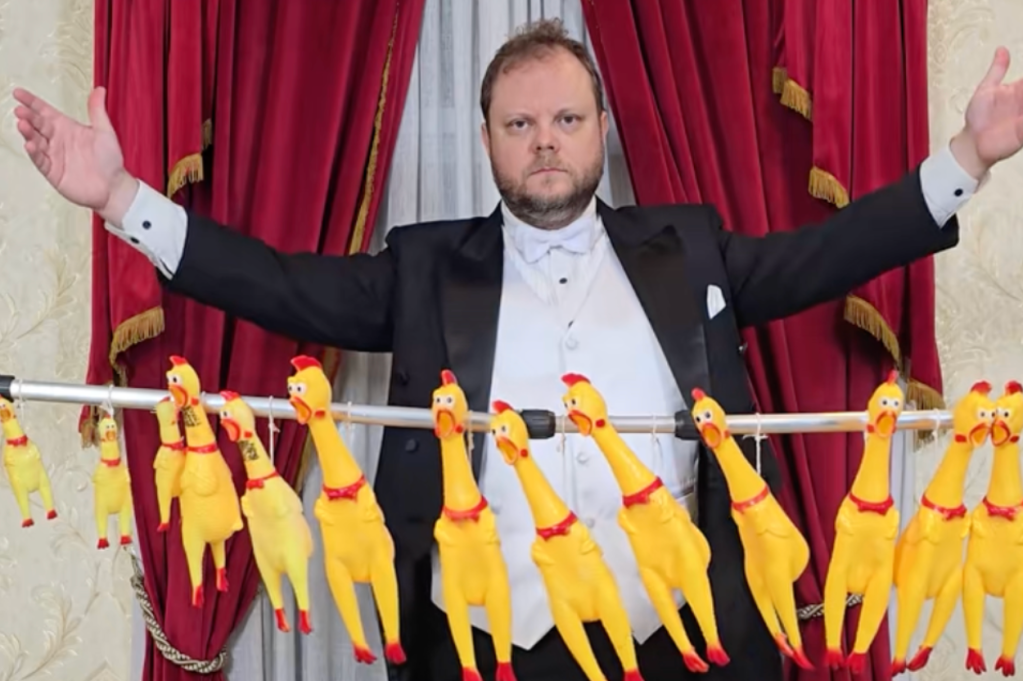UPDATE: The organizers of the “Dash for Cash” have apologized and are making extra donations to all teachers who signed up for the competition. Read that story here.
Sometimes winning a prize isn’t rewarding, entertainment isn’t entertaining and a feel-good story doesn’t feel good at all. This is one of those times.
A hockey game intermission in Sioux Falls, South Dakota this weekend included a “dash for cash,” in which 5,000 $1 bills were dumped onto a carpet in the middle of the rink and a handful of local teachers got to scramble on their knees to shove as many of the bills as they could into their clothing. Whatever they grabbed they could use in their classrooms.
The people who educate our children, on their knees, competing in a mad dash to cram dollar bills into their clothing to pay for classroom supplies, while spectators watch and cheer? Who thought this was a good idea?
Video of the event, which took place after the first period of the Sioux Falls Stampede hockey game, was shared by reporter Annie Todd on Twitter. It looks just as dystopian as it sounds.
First, garbage bags full of $1 bills were dumped into a big pile. All I can think is, someone had to go get 5,000 single dollar bills and someone had to stuff them into garbage bags, knowing what was going to be done with them.
Did everyone involved here think this was a good idea? Did it warm their hearts to think of school teachers, who are already overworked and undervalued, desperately scraping the ground to pick up those dollar bills so their students could have some new books or markers or Kleenex? Really?
Then came the footage of the “dash for cash.” It’s been many years since I taught in a classroom, but as a former teacher, these videos genuinely made me want to cry.
Are you seeing what I’m seeing? The people who educate our children should not have to participate in demeaning public spectacles for others’ entertainment in order to pay for things in their classrooms. Ever. Period.
And yet, enough people thought this was a good idea that it was organized and took place, which is baffling. Look at the description of the event on the Stampede hockey team’s website:
“New this season, the Stampede and CU Mortgage Direct are looking for teachers who would like to raise some cash for their classrooms! Not just some cash, but more than $5,000 will be going back to local schools! Teachers will compete to raise money in two ways.
1) Tickets – Each teacher will have their own ticket link that they can share. Each ticket bought will equal $5 that goes back to their school! In addition, the teachers that sell the most will get additional prizes.
2) Dash for Cash – During the 1st intermission on December 11th, teachers will compete against one another to grab as much cash as they can! There will be 5,000 $1 bills on the ice and teachers will get to keep all the money they grab for their classroom!”
Why are we inviting teachers to “compete to raise money” for classrooms as if that’s normal? Why are we describing teachers selling tickets to sporting events to get money for their schools as if it’s a great opportunity for them and not an indictment of our educational system? (Did I mention that South Dakota ranks close to last in teacher pay?)
Teachers do enough already. Anyone who has taught in a classroom can attest that teaching alone is enough of a job and that teachers are not paid nearly enough to do it. In no civilized universe should we expect teachers to fundraise their own jobs, much less celebrate them competing for resources as a form of entertainment.
Some might say, “Hey, $5,000 is $5,000 right? Shouldn’t these teachers be grateful?” I’m sure they are. Because teachers are thankful for every dollar they get to help their kids have a safe, comfortable, enriching learning environment. Most teachers—94%, according to the National Education Association—pay for classroom supplies out of their own pocket, so yeah, they’re happy to get anything. But if someone wants teachers to have money, just donate it. Don’t turn it into a humiliating, gladiator-style competition with $1 bills. It’s just gross.
I mean, try to imagine a group of doctors scrambling for cash like this in front of a crowd to buy surgical equipment. Imagine business execs dropping to their knees to pick up dollar bills as fast as they can to buy office supplies. Imagine military personnel grasping at singles to pay for their tactical gear.
We would never see that. It would be absurd.
Teachers are professionals who deserve so much better than this. I hope whoever organized the event rethinks ever doing it again in the future and donates some extra cash to these teachers to apologize for the bad call.
























